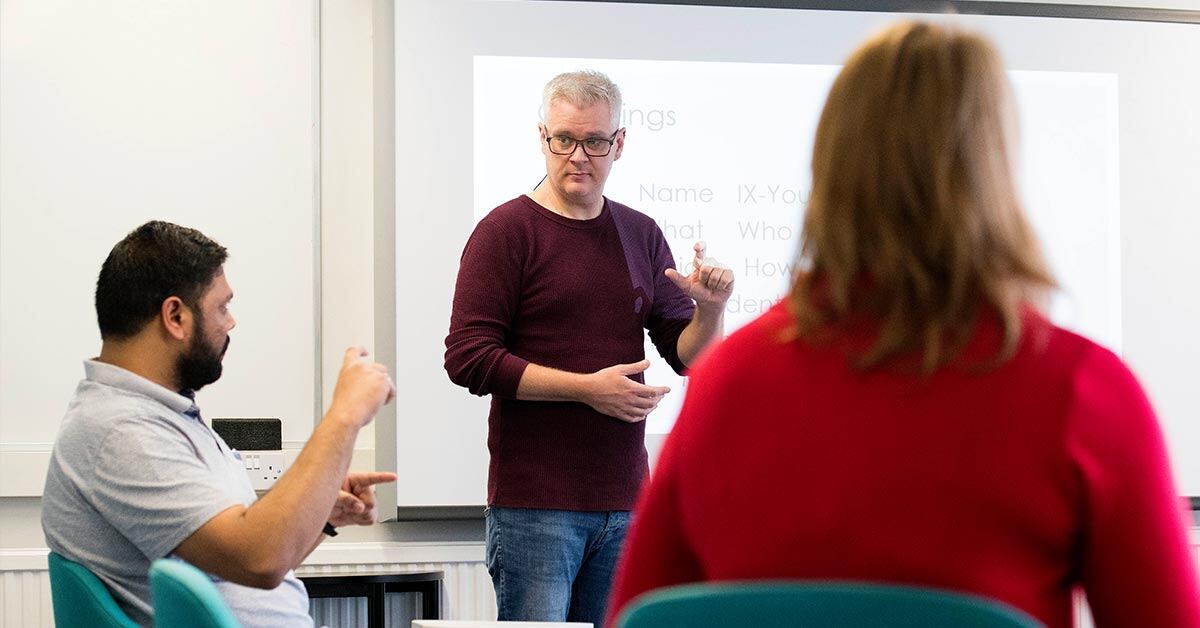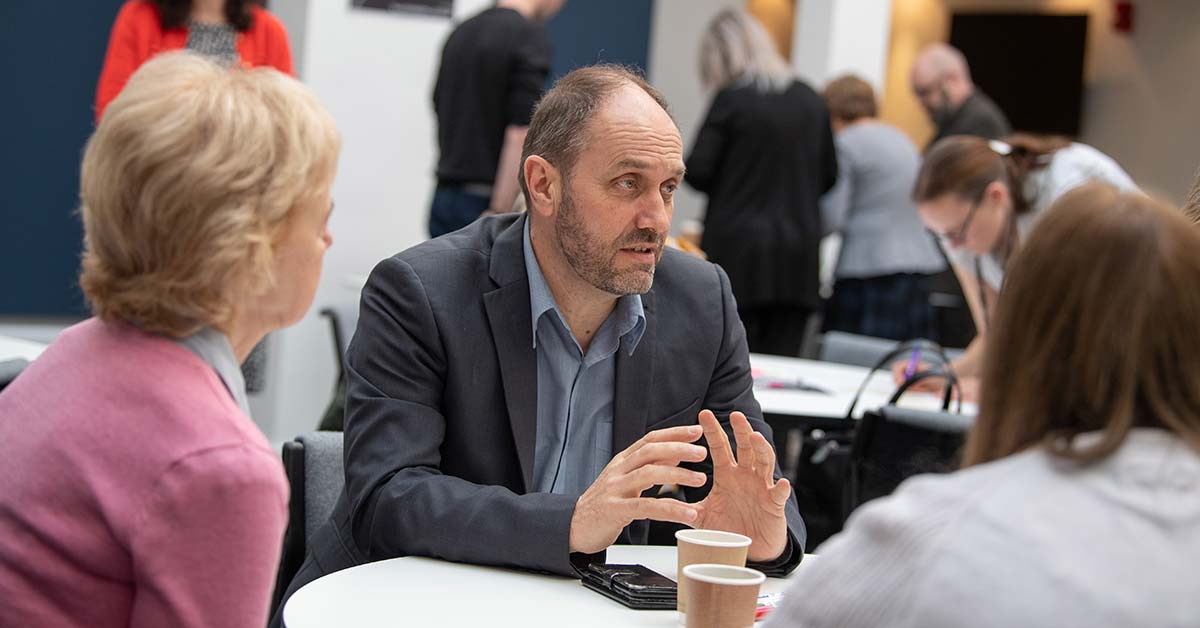Gain insights from academics and experts in the field via live webinars that can be watched back at any time, along with regular feedback and assessments
Course details
Delivery: online, part-time
Duration: two years
Start dates: Future start dates are to be confirmed.
Fees: £8,549 (flexible payment plans available)
Course overview
Gain the tools you need to help bring out the best in people.
Our online MSc in Human Resource Management (HRM) is designed to give you an advanced level of knowledge, understanding, and ability around people management and leadership.
With direct support from our teaching staff, you can look forward to learning how to effectively analyse business needs; drive changes in organisational culture, improve internal performance, and much more.
Accreditation

Our course is accredited by the Chartered Institute of Personnel and Development (CIPD).
The CIPD is the professional body for HRM professionals and is recognised in the UK, Ireland, Middle East, Asia, and beyond.
Graduating from our MSc also gives students the CIPD Level 7 Advanced Diploma award - the highest level of qualification offered by the CIPD. This means that upon completion of your degree, you'll instantly be able to apply for Associate Membership of the CIPD (fees will be payable) and with the relevant experience be able to apply to update membership to Chartered Member status.
Why study with us?
Flexible study
Contemporary content
Benefit from a contemporary education founded on the research work of the Institute for Research into Organisations, Work and Employment (iROWE)
Professional growth
Receive resources to strengthen your independent learning capabilities, so you can continue to develop your HRM expertise even after graduation.
Learning outcomes
Through this postgraduate course, we’ll teach you how to apply a wide range of internationally relevant skills and processes needed to establish yourself as a proficient HRM professional / people manager.
Upon completing your MSc in Human Resource Management, you’ll be able to:
-
Critically evaluate how to build organisational structure and capacity through people management and developmental processes
-
Encourage regular, systematic improvements to performance and professional development across the workplace
-
Strategically assess trends and best practice that can be imported from outside the organisation to improve business processes
-
Analyse the methodologies of colleagues and stakeholders and champion professionalism in the HRM practice
Watch the Q&A
Hear from Course Leader, Claire Ashworth and members of the support teams to learn more about the MSc in Human Resource Management:
- Good evening, everybody, or good afternoon, or good morning, depending on where you've come from today. Thank you so much for attending this evening. It's really, really great to have you all here. We're so pleased to be holding yet again another live event with our team and with other members of the faculty as well. It's an absolute pleasure to be presenting this course as well.
Human resource management has really, really been a popular course for us. And were getting so many applicants coming through, and our cohort is growing and becoming more vibrant every time we look at it. So I'm so, so, so glad to have you here. So welcome to Q&A, Studying Human Resource Management with UCLan Online.
My name is Dan. I'm a student recruitment consultant. I may have spoke to a few of you before, either regarding your interest for the course or indeed being with you throughout the whole process to your application. Joining us as well, it's an absolute pleasure to have Claire Ashworth here again who is the lecturer and course leader for Human Resource Management. Claire is also a chartered member for CIPD and an ILM member as well. So it's fantastic to have her here.
My belief is you can put anything you learn into practice from day one, which is the good news. So, for example, the way you may think about something at work-- so, for example, just the way you may be in a team meeting and you're always frustrated with the way the meetings go, or the colleagues in the room seem to maybe not grasping what you are, by doing a course like this, yes, you're going to learn the HR information straight away.
But you're going to start to develop this critical thinking. And you're going to start to have a greater appreciation for everybody saying in the room-- that doesn't mean say you're going to agree with them and nor should it. But it might make you think, oh, hang on. This is why they're saying that. They're coming from a different perspective.
And I think, because there's going to be people studying from all over the world, you are going to be flooded with different perspectives. If it's in your discussion area where you put responses and we like you to respond to other students' posts to gain awareness or the live webinars, you're really going to be able to start appreciating different points of view.
And that's really imperative to HRM because we're all humans. We're all different. We've all got a back story. Yes. We might all have the same job title. We might have all studied the same qualifications. But we are all human. And I think that's the bit that this degree will give you that real awareness that we are all different and one size really fits all. And we're not machines yet. So I think that would be one example.
And other students have reported to me they've just got confidence now in a meeting where they may not be a manager, or they may be the manager and feel under or overwhelmed. They can actually speak on a topic to do with people managing with confidence and know that they can find an answer somewhere. And if they don't know the answer, they can go back to their fellow peers and find it for the next week.
For every module you do, the way the VLE, the Virtual Learning Environment, works, you'll be asked to contribute to a discussion board. And often, that is put in your thoughts about something. It may even be uploading a photograph of something we asked you to capture around the workplace or a feeling or emotion or a mind map. It could be anything.
But initially, how you will collaborate is we will get you to respond to other students' posts and maybe start a dialogue to try and understand where that thinking has come. Or, oh, that's a really good idea. I never thought about it that way.
Furthermore, then during the live webinars, you'll be with your tutor. We'll give you questions and get you talking hopefully with each other speaking as we are now. But there will be the chat facility as well. And we are aware that students then also start to create their own groups outside or alongside sort of the official platform. So I know one of my groups of students have a very vibrant WhatsApp group. That's all instigated on their own.
And they use that for peer support. And it's also probably a platform to moan about assignments and studying and the dramas and the deadlines and all the things that come with studying. And that is really important. As a student myself, I have a WhatsApp group. And it's a place we can go totally outside of our studies. We control it. We decide when we switch it on and when we switch it off. And I mute notifications quite regularly because I just can't deal with-- I need a break from a study day.
And they're really important platforms to make friendship groups but also just to support each other over and above outside. It may not be WhatsApp you use. There may be another platform. I know some students use WeChat because that's a platform that's used in China. And I've used that as well, and that works really well. So there's those ways.
So I would say, first and foremost, and it's something I will say to anybody, you need to be curious. You need to want to learn or find out what's going on and be able to question things, not just say, oh, well, if he's written in a textbook or somebody famous has spoken about it, then it must be right. No. That's not what studying at a master's level is about.
It's about finding out things and inquiring and having that mind to say I want to know why. I want to know what's behind. So that's the first thing-- that hunger for knowledge. Good time management has a really good skill set to have. Even if you're not brilliant at it, have a system in place to help you, so a good diary, whether that's you're on your phone or not. But if you have one, use it. Don't forget it's there.
Make time for studying. Make space in your life wherever that is. And I think we've already spoken about the flexibility. But also make time for you, sort of time off. That's really an important part of time management.
You need to be organized in the sense that or-- it's probably more determined and sort of-- I've forgotten the word as I'm trying to say it-- but self-disciplined. There we go. Because studying online is very self-disciplined. And I'm in awe of everybody that does it. So that would be there.
We, obviously, are always looking for a level of being able to write. And obviously, on your application part of that, and part of your qualifications tells us that. But be willing to improve your writing. I'm speaking from experience here, whenever you get some feedback from your tutors and they critique your writing, it hurts. It's you feel, oh, no. What have I done?
But it's just saying, OK, let me learn from this. And let me develop that further. And there's lots of resources out there. And we're never too old to learn, my tutors keep telling me as well. They're the key skills. What was the second part of the question over here? Sorry.
- It was, yes, what skill set is required to be successful?
CLAIRE ASHWORTH: Yeah, I think that's probably the key ones. I just think the human. That's a really important skill set. Be yourself. Don't feel you have to be this person you're not.
Often, when we're in a room of students, and people are talking, and they sound, oh, they seem to know a lot more than I do, remember, we're all human. And we've all got things going on. And it's OK to ask questions. And it's OK to get things wrong because by getting things wrong we're going to learn. So just trust in yourself and don't lose that human part because we're studying people after all.
So you will be learning and getting to know about things such as AI, artificial intelligence. Are the robots taking over? Will they replace humans in work? And I always smile when I say that because I remember having that conversation as, probably, a 5 or 6-year-old. We were talking about robots in class. And we all laughed and giggled and thought that was really silly. I was in a restaurant last week and a robot served me my food.
So yes, it is coming. I think you will learn about things such as-- those of you that are in the UK or you may have seen this certainly in Europe over the summer, we've had mass P&O Ferries, a large ferry company, they illegally sacked all their staff and then wanted to replace them with agency staff.
So we will discuss as far as possible sort of recent things that are going on in the world of work, and unpicking them, and looking from the HR perspective. Can we do that? Is that right? Is that morally right?
Data, as well, data is coming and ruling the world. As a people person, I resent being a number. But numbers, and data, and trends tell us what's going on. So if we use the pandemic, we can't escape it. I try not to mention it. But that showed us and showed the world we can work in a different way. Look, we're doing this online.
We're talking about online studying. We only have to go back 15, 20 years. And that's not very long. It might seem long to some people. But it's not that long ago. And we think, you're doing that all online? That's a bit bizarre, having to post your assignment in the post, and hope it gets to your tutor. So the pandemic has showed us that we can do things differently.
Hopefully, that's changing hearts and minds as well as balance sheets. So we will always look to use contemporary topics that are in the workplace. We will have debates on such as, again it's in the UK, things like menopause at work, and women's health, and men's health, and that we should talk about it. And should we develop our policies to make them more family friendly?
And how are we becoming allies of different genders? We know there's over 50 different gender types. So how are we reflecting that in our workplaces? And if we're not, what's stopping us? So there are lots we bring into this as far as possible.
And we want our students, because many of you will be working, when you get to your discussion boards and webinars, if the topic hasn't been covered or you think there's something else, bring it up, discuss it. Especially in that module, the strategic futures module, because that's the perfect place for it.
So it has to be working-from-home, hybrid working. I think that's been massive. This idea that we can trust our employees, but we can also trust our own colleagues in HR that we don't have to be in the office to be seen as doing work. That remains a topic of concern-- not concern, of debate because there are still some managers, bosses, owners that feel that they have to have a control on their employees. And the pandemic has taught us that we can do things differently. We can still be productive.
And as a result, that's having an impact on policies. So if we think traditionally we would call them possibly family-friendly policies. It's more than family-friendly because that implies you can only be friendly if you have a family. But it's looking at more that, why can't we choose how or when we work as long as we get our work done, if we're measured on outputs? But that has to impact and flow through on our policies.
But for it to flow through onto our policies, we need to make sure the organization is aligned as a whole. So then, we get into the realms of talking about the strategy of the organization. And we're seeing that organizations are having to have a shift. Do they need three managers in one team? Lots of hierarchies and levels, whereas actually we might just need one person to be an overseer. And we could be empowered to make our own decisions as long as they're not crazy stupid.
So it's definitely the pandemic has prompted, and pushed, probably given HR a kick up the bum, if I'm honest and if I'm allowed to say that. To say, look, we can do things differently. It doesn't have to be traditional thinking. We can move things.
But we can't just change one thing. If we change one thing, it's like if you remember as a child maybe playing with dominoes, or playing Jenga, all those games, if you move one piece, other things can fall down or just not work anymore. So it's being able to be the voice to influence those in charge or those with the perceived power that we need to change.
And I think that's the real challenge. And I think that's the real exciting thing about HR now. And if I could go back and start my HR career during a pandemic, I think I would. That's a bit weird to say that. But I think to be part of that change then would be an amazing.
When I was in HR when I first began, we did all the management. We managed everything about people. If anyone had a problem or they wanted to request some time off, they would come into HR. So we're talking a long time ago. We've had a massive shift where it's called devolvement. The line managers are now responsible for a lot of that. And I think that the majority of people that manage people probably do that. And we've seen HR departments shrink.
But they've shrunk to a point now that we are becoming experts, if that makes sense, in providing advice and guidance. Yes, there is still a role of policy and the sort of administrative side. I think we will see more support. We will see the future of HR moving towards a lot more providing guidance, and potentially more grievances, and disciplinary hearings providing the support. Because I think as people have-- I say, as we have greater access to social media, it sounds like we've only just had it.
As people are more knowledgeable, and there's more access to information, and social media in particular, it's making some people more aware of their rights at work. And I think that's uncovering some perhaps less savory practices or things that we'd want to happen in our organizations. So therefore, HR has a role of making sure that if there's a sort of disciplinary grievance side, that's managed well in the employee relations.
And I think in the UK at the moment, there's a lot of talk about strikes, more organizations striking. We've got trains. We've got the nurses are talking about striking, the post office. So there's something going on. I think that's possibly linked to UK politics and the finances. So I think in the immediate future, we're going to see a need for HR to very much be that broker of the voice between management and the trade unions.
And support managers in that, you don't have to do it. It doesn't have to be us and them. And we can do it together. And we can be very successful. But it takes somebody in the middle, which is often HR because we're good at that stuff.
I also think it will-- we'll see them becoming more of agents of change. And by that I mean people that advocate and support change. So we support managers going through change because it's about behavior.
Just to explain the point, so I'm not going to make this into a lecture. I promise. But if you're asked to do something differently and you don't want to do it, often if you think about your behavior, you might sulk. You might be angry. You might deny it. You might just say, it's not happening. I'm not doing it.
Well, that's what we do. That's how we react to change. So HR, change agents, what we try and do is help the people along through that process. So that's by telling managers just give them time. Give your employees a couple of days to just think it over or put things in place. So I think we're going to become very much more agents and the agency by moving things on.

Hear from a student
"Not only did the course provide me the practitioner skills I needed to be a HR professional, but also the theoretical skills to become an academic. The support offered by the tutors encouraged me to pursue my PhD, a journey I am excited to continue with UCLan."
Abigail Allen, on-campus student
Module overview
This module will help you develop a critical understanding of the theory and practice associated with managing people.
You’ll explore how organisations are shaped by internal and external environmental contexts and how people management practices are designed to reflect sector trends, performance, and productivity indicators.
We’ll support you in developing your understanding of research methods and methodologies, while also furthering your understanding of key research issues in the field of HRM.
During this phase of your course, you’ll learn how to evaluate and justify the use of specific methodologies when addressing various HRM issues. You’ll also discover how to evaluate research that influences organisational policy and practice.
This module will give you the chance to analyse, explore, and assess the challenges and complexities for people management in organisations that operate across multiple nations and cultures.
Your studies will focus on how to devise and implement HRM processes that are ethically responsive and sustainable – while still considering any differences in working practices, cultures, and institutional factors.
For this part of the programme, we’ll shift focus to how HRM strategy can identify and respond to global trends and challenges.
You’ll learn the extent to which workforce planning can help organisations respond to trends, and how to evaluate the extent to which data can influence people management. The module will also help build your understanding of how laws and regulations might impact an HRM practice.
This final stage of your course will challenge you to undertake an academic or practice-oriented research project that addresses an HRM-related issue or question.
At the start of the module, you’ll be presented with several research projects associated with your chosen discipline from which you can choose from. A project supervisor will then be assigned to aid you in developing ideas and planning the project.
By successfully completing the project, you’ll fortify your ability to independently analyse research findings, evaluate the effectiveness of different research methods, and critically reflect on your own conclusions to apply them to your practice.
Entry requirements
-
You must hold at least a 2:2 degree or equivalent professional experience or learning in a related field. However, please note that we’ll consider all candidates on their individual merits.
-
If you don’t speak English as a first language you’ll need to hold a minimum IELTS score of 6.5 or an accepted equivalent.
Unsure if you have the right qualifications or experience for our online MSc in Human Resource Management? Don’t worry – we know that it’s impossible to measure everyone’s capabilities in the same way.

Hear from a student
"The course provided me with the underpinning knowledge for the acquisition of a new role within an organisation experiencing large scale change. In the future, the knowledge gained from this course will support me should I wish to specialise or develop in a specific area of the HR function."
Stephanie Rainford, on-campus student
Want to learn more?
How we teach
We offer an interactive mix of weekly webinars, forums, and learning activities to keep you engaged and challenged during your studies with us. However, you’ll also be given the freedom and flexibility to access these resources at your own time, to best fit your schedule.
In addition, we’ll provide guidance on how to identify, locate, and use the online material available in the Library. Comprehensive bibliographies are provided for each module, as are guidelines for when you’ll be expected to produce essays, projects, and your dissertation.
How you're assessed
Throughout the distance learning programme there will be a combination of formative and summative assessments. There are no exams.
Formative assessments will typically involve tutor feedback on your essays, presentations, reflective journals, or other projects. Summative assessments will typically take place through essays and assessed coursework – your dissertation being one example.
Careers and opportunities
There’s more scope than ever for HRM experts. As companies across the world continue to expand across borders and adapt to ever-changing business and social landscapes, the demand for forward-thinking HR departments led by qualified professionals is only increasing.
Plus, earning your MSc in Human Resource Management will not only help you gain essential, subject-specific expertise, but a whole range of transferrable skills invaluable to any career.
Upon graduating, you’ll possess the critical thinking, research abilities, and people management knowledge needed to secure a future across multiple industries, depending on your area of interest. In addition to this, you'll have a Level 7 qualification from the CIPD to add to your resume.
Though there are a number of roles you could progress to, some of the positions you could explore include:
-
Human resources officer / advisor
-
HR business partner
-
Management consultant
-
Project coordinator
-
Employee relations specialist
Check out our MSc Human Resource Management careers page for more information on potential career paths open to you.
Institute for Research into Organisations, Work and Employment (iROWE)
iROWE conducts and shares leading research to promote the development of workplace best practice and employment policy.
As a student of this course, you’ll be able to become an associate member of the institute and gain access to its wide network and range of published material.
The institute regularly collaborates with organisations such as the TUC, ISBE, CIPD, ACAS, and the RSA.
Most recently, iROWE worked alongside the local government to establish a set of hybrid-working principles to aid small and medium enterprises (SMEs).
Ongoing projects include:
-
Exploring Healthy Ageing, Wellbeing, and Productivity
-
Recognising Domestic Abuse as a Workplace Issue
-
Coworking and Community

Hear from a student
“From the beginning it’s been clear that UCLan has a really effective system for supporting online students.”
- Sophie Liebe-Kreutzner, MSc in Human Resource Management
More resources
See all resources
How does HR support employees?
Explore the essential role of HR teams in business, supporting employees through onboarding, talent...
Read the story
Your Guide to HRM Software
Discover how HRM software can revolutionise your business efficiency and employee management with...
Read the story
How does culture affect HR management?
Gain a deeper understanding of how HR teams must consider employee culture, how to do so, and the...
Read the story

.png)
.png)


